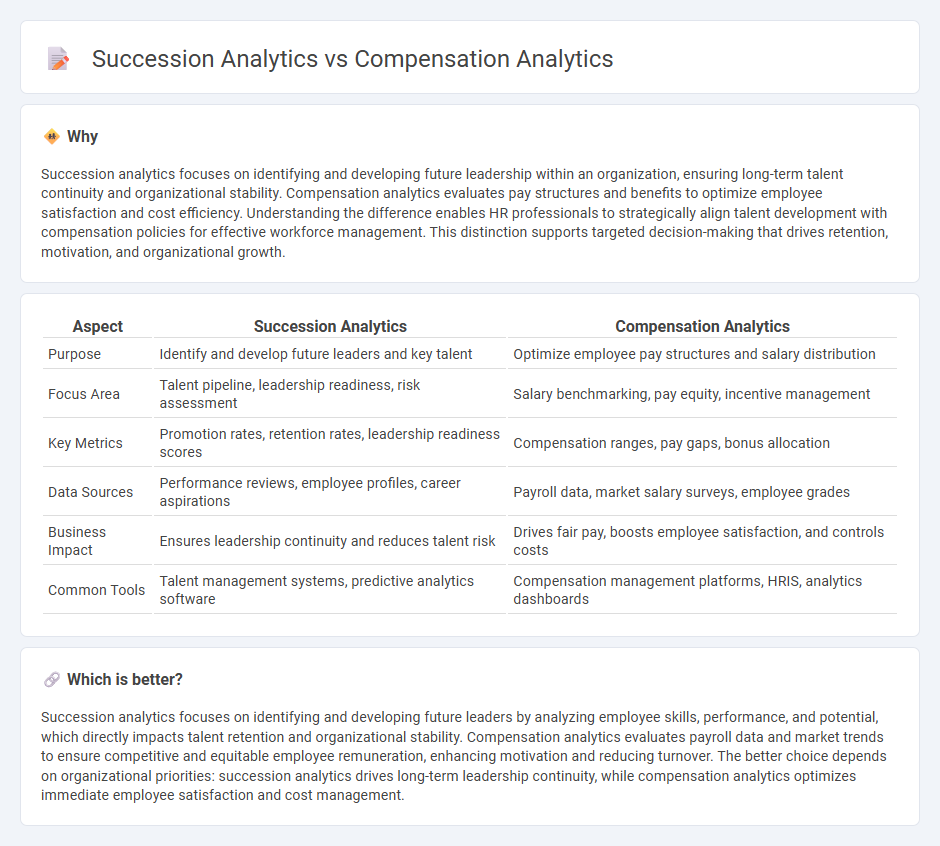
Succession analytics focuses on identifying and developing internal talent for future leadership roles, using data-driven insights to predict employee potential and readiness. Compensation analytics examines salary structures, benefits, and market competitiveness to ensure equitable and motivating pay strategies. Explore the key differences and strategic advantages of succession analytics versus compensation analytics in optimizing workforce management.
Why it is important
Succession analytics focuses on identifying and developing future leadership within an organization, ensuring long-term talent continuity and organizational stability. Compensation analytics evaluates pay structures and benefits to optimize employee satisfaction and cost efficiency. Understanding the difference enables HR professionals to strategically align talent development with compensation policies for effective workforce management. This distinction supports targeted decision-making that drives retention, motivation, and organizational growth.
Comparison Table
| Aspect | Succession Analytics | Compensation Analytics |
|---|---|---|
| Purpose | Identify and develop future leaders and key talent | Optimize employee pay structures and salary distribution |
| Focus Area | Talent pipeline, leadership readiness, risk assessment | Salary benchmarking, pay equity, incentive management |
| Key Metrics | Promotion rates, retention rates, leadership readiness scores | Compensation ranges, pay gaps, bonus allocation |
| Data Sources | Performance reviews, employee profiles, career aspirations | Payroll data, market salary surveys, employee grades |
| Business Impact | Ensures leadership continuity and reduces talent risk | Drives fair pay, boosts employee satisfaction, and controls costs |
| Common Tools | Talent management systems, predictive analytics software | Compensation management platforms, HRIS, analytics dashboards |
Which is better?
Succession analytics focuses on identifying and developing future leaders by analyzing employee skills, performance, and potential, which directly impacts talent retention and organizational stability. Compensation analytics evaluates payroll data and market trends to ensure competitive and equitable employee remuneration, enhancing motivation and reducing turnover. The better choice depends on organizational priorities: succession analytics drives long-term leadership continuity, while compensation analytics optimizes immediate employee satisfaction and cost management.
Connection
Succession analytics identifies high-potential employees and predicts leadership gaps, providing data essential for designing competitive compensation packages aligned with talent retention goals. Compensation analytics evaluates pay equity, market trends, and incentive effectiveness, ensuring that succession plans are supported by appropriate financial rewards to motivate and retain key talent. The integration of these analytics enables organizations to strategically align workforce development and compensation strategies, driving long-term business success.
Key Terms
**Compensation Analytics:**
Compensation analytics involves analyzing employee salary, benefits, bonuses, and pay equity to optimize workforce costs and improve retention strategies. It uses data such as market salary benchmarks, employee performance metrics, and compensation trends to drive fair and competitive pay structures. Explore more about how compensation analytics can transform your talent management approach.
Pay Equity
Compensation analytics examines salary data to identify pay disparities and ensure compliance with pay equity laws, focusing on equitable remuneration across roles and demographics. Succession analytics evaluates talent pipelines and leadership readiness but less frequently addresses immediate pay equity concerns. Explore how integrating both analytics enhances comprehensive organizational fairness and strategic workforce planning.
Market Benchmarking
Compensation analytics centers on analyzing salary data, employee benefits, and market pay standards to ensure competitive remuneration aligned with industry benchmarks. Succession analytics emphasizes identifying and developing internal talent for key roles, factoring market trends to align leadership pipelines with future organizational needs. Explore in-depth strategies to leverage market benchmarking for optimized compensation and succession planning.
Source and External Links
What Is Compensation Analytics? Meaning And Benefits - Compensation analytics uses data to evaluate how pay and benefits impact employee performance, satisfaction, and retention, helping companies ensure pay equity, benchmark salaries, and align compensation with business goals.
A Guide to Compensation Analysis - AIHR - Compensation analysis involves gathering detailed compensation and employee data to benchmark salaries against market standards, understand pay equity, and inform strategic pay decisions through a multi-step process.
A Step-by-Step Guide to Compensation Analysis | ClearCompany - Compensation analysis assesses internal pay structures and benefits against external market data to ensure fair and competitive compensation, considering factors like job role, seniority, region, and benefits for strategic workforce planning.
 dowidth.com
dowidth.com